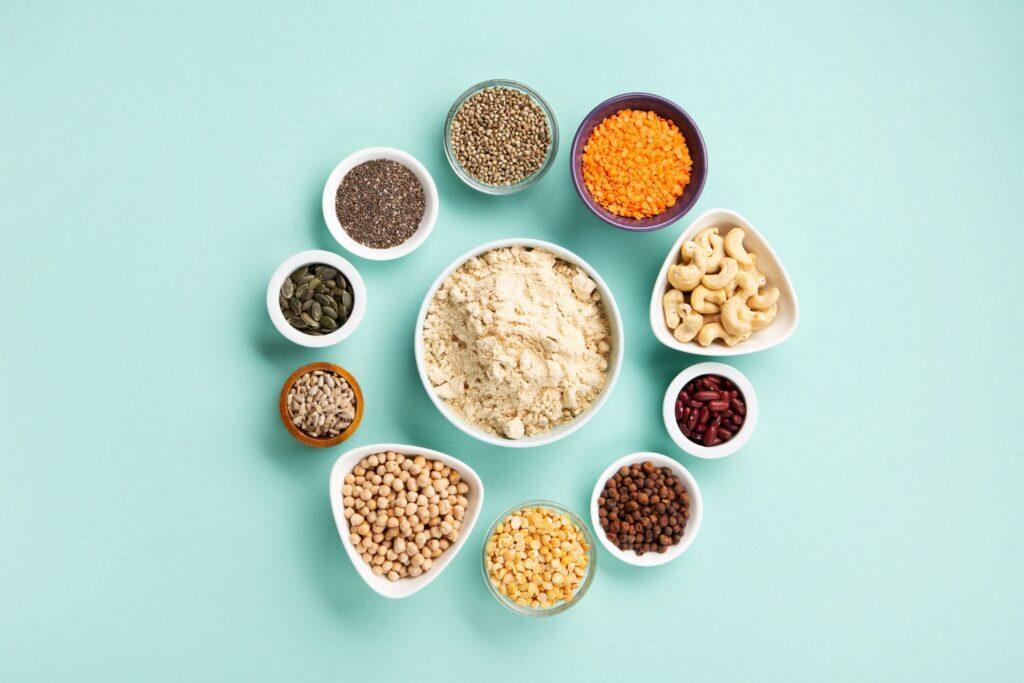Protein is an essential macronutrient due to its muscle-building benefits and ability to support various bodily functions. Traditionally, protein has been synonymous with animal sources.
However, in recent years, plant based protein has emerged as a popular and effective alternative for those looking to enhance their fitness and health. There are plenty of benefits to eating plant based proteins to help you excel in your fitness journey.
Benefits of Eating Plant Based Protein

Plant based protein sources promote muscle building and contain phytonutrients that support various bodily functions. Here are seven benefits of eating plant based protein regularly:
1. It Offers a Complete Protein Profile
One common misconception about plant based protein is that it lacks certain essential amino acids found abundantly in animal products. However, with proper planning and variety in your diet, you can easily obtain all the essential amino acids from plant based sources.
These plant based foods contain complete protein profiles, ensuring your body has the necessary building blocks for muscle repair and growth:
- Quinoa
- Hemp seeds
- Chia seeds
- Soy products like tofu and tempeh
2. It Boosts Your Digestion

Plant based protein sources are often high in dietary fibre, which is crucial for digestive health. Unlike some animal products, plant based sources typically contain fibre, promoting regular bowel movements and supporting a healthy gut microbiome.
A well-functioning digestive system is essential for nutrient absorption and well-being, allowing you to maximize the benefits of your fitness efforts.
3. It Keeps Your Heart Healthy
Many plant based protein sources are naturally low in saturated fat, making them heart-healthy choices. While some animal proteins, such as those in processed meats, can be high in unhealthy fats, plant based options like beans, lentils, and tofu offer protein without the added fat.
However, plant based meat alternatives often contain high levels of unhealthy fats or highly processed vegetable oils, which can contribute to cardiovascular issues if consumed in excess.
Additionally, some vegan meat products include food dyes to mimic the appearance of meat. Some of these dyes, like red 3, have been linked to cancer. Food dyes can also cause allergic reactions in some individuals.
4. It Optimizes Muscle Gain

Protein is a fundamental component in muscle development and repair. When you consume plant based sources strategically alongside resistance training, these proteins provide the building blocks to stimulate muscle protein synthesis, ultimately aiding muscle hypertrophy.
5. It Speeds up Your Recovery
Beyond muscle growth, incorporating plant based protein into your diet can expedite post-exercise recovery. The rich variety of plant nutrients — including antioxidants, vitamins, and minerals — are crucial for reducing inflammation, repairing muscle damage, and replenishing glycogen stores.
Foods like leafy greens, berries, and nuts deliver a potent dose of these recovery-enhancing nutrients, alleviating soreness, improving muscle function, and restoring energy levels more efficiently.
6. It Boosts Your Energy Levels

Protein is a fantastic way to boost your energy levels, providing sustained vitality to fuel your active and travel lifestyle. Unlike refined carbohydrates and sugary snacks that can lead to energy crashes, plant based protein offers a steady energy release, keeping you feeling fuller for longer and providing a stable blood sugar level.
Additionally, plant foods rich in iron, such as lentils, spinach, and tofu, prevent fatigue by supporting red blood cell production to transport oxygen throughout the body.
7. It Strengthens Your Bones
Strong bones are crucial for excelling in the gym, on the track, and throughout your fitness journey in general. Many foods, such as tofu, tempeh, leafy greens, and almonds, are rich in calcium, a mineral essential for bone health.
Additionally, plant foods provide a variety of nutrients that support bone density, including magnesium, phosphorus, vitamin K, and vitamin D. These nutrients work synergistically to promote bone formation, maintain bone strength, and reduce the risk of fractures and osteoporosis.
How Much Protein Should You Aim for?

The optimal amount of protein depends on various factors, including age, gender, activity level, and fitness goals. As a general guideline, the recommended dietary allowance for protein is 0.8 grams per kilogram, or 0.36 grams per pound, of body weight per day for sedentary adults.
However, if you engage in regular exercise or strength training, you may require more protein to support muscle repair and growth. The American College of Sports Medicine suggests that athletes and active individuals may benefit from consuming 1.2 to 1.7 grams of protein per kilogram of body weight per day, with higher intakes for those participating in intense or prolonged training.
What Are the Best Plant Based Protein Sources?

There are plenty of plant based protein sources available, with many offering superior nutritional density. Here are some of the best options to include in your diet:
- Legumes: Beans, lentils, and peas are excellent sources of protein, fibre, and essential nutrients. They’re also rich in complex carbs, providing sustained energy and satiety.
- Soy products: Foods like tofu, tempeh, edamame, and soy-based meats are complete protein sources, containing all essential amino acids. Soy products are rich in phytoestrogens, which may offer benefits like heart health and hormone balance.
- Whole grains: Quinoa, brown rice, oats, and barley are great carbohydrate and protein sources. They offer a range of vitamins, minerals, and antioxidants, supporting overall health and well-being.
- Nuts and seeds: Almonds, walnuts, chia seeds, and hemp seeds are protein-packed snacks and additions to meals. They also provide healthy fats, fibre, and micronutrients like magnesium and zinc, benefiting your heart and immune system.
- Seitan: Made from wheat gluten, seitan is a high-protein meat substitute commonly used in vegetarian and vegan cooking. It’s versatile, and you can season and cook it in various ways to mimic the texture and flavour of meat.
Prioritize Plant Based Protein

There are many benefits of eating plant based proteins, especially as an active individual. From providing essential amino acids for muscle growth to supporting digestive health and strong bones, plant based proteins are a valuable addition to any fitness-focused lifestyle.


